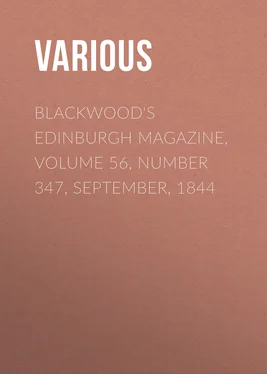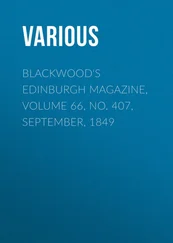Various - Blackwood's Edinburgh Magazine, Volume 56, Number 347, September, 1844
Здесь есть возможность читать онлайн «Various - Blackwood's Edinburgh Magazine, Volume 56, Number 347, September, 1844» — ознакомительный отрывок электронной книги совершенно бесплатно, а после прочтения отрывка купить полную версию. В некоторых случаях можно слушать аудио, скачать через торрент в формате fb2 и присутствует краткое содержание. Издательство: Иностранный паблик, Жанр: foreign_antique, periodic, foreign_edu, на английском языке. Описание произведения, (предисловие) а так же отзывы посетителей доступны на портале библиотеки ЛибКат.
- Название:Blackwood's Edinburgh Magazine, Volume 56, Number 347, September, 1844
- Автор:
- Издательство:Иностранный паблик
- Жанр:
- Год:неизвестен
- ISBN:нет данных
- Рейтинг книги:3 / 5. Голосов: 1
-
Избранное:Добавить в избранное
- Отзывы:
-
Ваша оценка:
- 60
- 1
- 2
- 3
- 4
- 5
Blackwood's Edinburgh Magazine, Volume 56, Number 347, September, 1844: краткое содержание, описание и аннотация
Предлагаем к чтению аннотацию, описание, краткое содержание или предисловие (зависит от того, что написал сам автор книги «Blackwood's Edinburgh Magazine, Volume 56, Number 347, September, 1844»). Если вы не нашли необходимую информацию о книге — напишите в комментариях, мы постараемся отыскать её.
Blackwood's Edinburgh Magazine, Volume 56, Number 347, September, 1844 — читать онлайн ознакомительный отрывок
Ниже представлен текст книги, разбитый по страницам. Система сохранения места последней прочитанной страницы, позволяет с удобством читать онлайн бесплатно книгу «Blackwood's Edinburgh Magazine, Volume 56, Number 347, September, 1844», без необходимости каждый раз заново искать на чём Вы остановились. Поставьте закладку, и сможете в любой момент перейти на страницу, на которой закончили чтение.
Интервал:
Закладка:
On one side comes a party led by a violin, women applauding. But the women do more than applaud. They carry great paving-stones to the top of the house, to be thence precipitated on the heads of the soldiers; they tend the wounded, they bruise charcoal for gunpowder.
There was, no doubt, some severe fighting during the Three Days; but, generally speaking, the military seem to have entered into the contest with reluctance. Some instances are here given of singular forbearance on their part. At a time when, in certain quarters of Paris, each house was converted into a sort of fortress whence the military was assailed, three men had placed themselves behind a stack of chimneys, and had, from this shelter, directed a destructive fire on the troops. They were at length discovered, and a cannon was levelled against the chimney. But, before firing, the gunner made signal to the men to escape, contenting himself with demolishing their breastwork. As another company of soldiers, led by its officer, was marching through the streets, one of the mob rushed forward, and, with a mad audacity, struck the officer on the head with a bar of iron. He staggered, and his face overflowed with blood; but he still had strength enough to raise his sword to put aside the muskets of his men, who were in the act of firing on the assailant.
We have here a vivid description of the taking of the Tuileries by the populace. Some amused themselves by mutilating the statues of kings, or by firing at the portraits of such of the marshals as they considered to have been guilty of treason to Napoleon. A number of artisans installed themselves in the chamber of the throne; they sat, each in his turn, upon the royal seat, afterwards they placed a corpse in it. Some of them drew, over shirts stained with blood, the court-dresses which had circled the waist of royal princesses, and strutted about in this masquerade. Riot and destruction as much as you please, but no theft—such was the order of the day. A young man was bearing off a hat, decorated with plumes of a costly description. “Where are you going,” cried his companions, “with that hat?” “It is only a souvenir,” said he of the hat. “Ha! good; but in that case the value is nothing.” So saying, they took the hat and trampled it under their feet, and then returned it to him—doubly valuable as a souvenir. Many striking traits of honesty were exhibited. One man brought a vase of silver to the prefect of police, and did not even leave his name. Another found a bag of three thousand francs in the Louvre, and hastened with the money to the Commune. The next day he was probably amongst the number who were wandering about Paris without bread and without work, driven out of employment by the commercial panic of their own glorious revolution.
A scene of a like grotesque description took place, at a later period, on the return of the mob from Rambouillet, where they had gone in search of the unhappy Charles X. The king had left Rambouillet before the mob reached it, so that they had nothing to do but to return, unless any work of demolition should invite them to stay. M. Degoussée, at that moment the man in authority, in order to save the royal carriages from destruction, bethought him of the expedient of offering a ride home in them to the most violent and redoubtable of the mob. In a moment these gilded vehicles, blazoned with the royal arms, were filled with the lowest of the rabble, who projected their pipes and their bayonets from the windows. These state carriages, drawn by eight horses, and driven by silken postilions, were heaped up, inside and out, with this riotous crew, who entered Paris in triumph, amidst the responsive jests and shouts of the populace. Driven up to the Palais Royal, they there descended from their splendid vehicles, and delivered them over to their new owner. “ Tenez—voilà vos voitures! ” they shouted, as they alighted under the windows of the Duke of Orleans.
It is curious to remark the contrast between the thoughtless, reckless bravery of the combatants of July, and the watchful timidity of the politicians who were ultimately to profit by their courage and infatuation. The soldiers had, at many points, fraternized with the people—all was success for the popular party—and the drawing-room of M. Lafitte was full of distinguished men of that party.
“The court of the hotel,” continues M. Blanc, “was now full of soldiers. Five of the royal officers entered the saloon. M. Lafitte, who had been wounded in the leg, received them sitting in an arm-chair. He received them with great blandness and dignity. ‘Gentlemen,’ said he, ‘keep your arms, but swear never to turn them against the people.’ The officers extended their hands, as if to take an oath. ‘No oath, gentlemen,’ said M. Lafitte with much emotion; ‘kings have dishonoured oaths. The word of the brave is sufficient.’ This was received with universal applause, and every one present resigned himself to the excitement of the hour; when suddenly a discharge of musketry was heard. How describe the tumult that in a moment filled the apartment! The royal guard was certainly victorious—the enemy would be down on them—every one fled. They rushed into the hall, they pushed, they struggled for egress. Some jumped through the windows of the ground-floor into the garden. Two deputies were found hiding in the stables. In an instant, M. Lafitte was abandoned by all those who had besieged his arm-chair. His nephew was the only person who remained with him. And what had happened? The soldiers of the 6th had followed the example of their comrades of the 55th, and, gained over to the cause of the people, they had fired their muskets in the air!”
Already, at the first outbreak of the revolution, some one had remarked—“here were a good game for the Duke of Orleans, if he has the courage to play it.” Courage he had, but equal caution it seems, equal prudence. A deputation had proceeded from the house of Lafitte to Neuilly, the residence of the Duke, to invite him to the throne; but it was the Duchess who received them. The Duke himself had taken refuge at Raincy. To Raincy messengers were sent. The Duke of Orleans ordered his carriage. Those who were waiting his arrival at Neuilly heard the wheels approach—heard them suddenly recede. The carriage had turned, and was regaining Raincy with all the speed possible. The resolution was not quite taken, or the pear was not quite ripe.
His entry into Paris, according to M. Blanc, was made on foot in the evening, and he clambered like a common citizen over the barricades. Arrived at the Palais Royal, he sent to notify his presence to Lafitte and Lafayette—representatives, the one of the Chamber, and the other of the Hotel de Ville—and also to the Duke de Mortemart, minister of Charles X. The interview with this last took place the same evening, and had for its apparent object to proclaim, in the presence of the minister, his attachment and unalterable fidelity to the elder branch of the Bourbons. When De Mortemart arrived, he was ushered into a little cabinet on the right, which looks upon the court, not ordinarily used as an apartment of the family.
The Duke of Orleans was stretched upon the floor, lying on a mattrass, in his shirt. His forehead was bathed in sweat; 2 2 As well it might, if he had been clambering over barricades in those hot days of July; for the three glorious days were remarkable for their heat.
the glare of his eyes, and every thing about him, betrayed a great fatigue, and a singular state of excitement. On seeing the Duke de Mortemart enter, he began to speak with great rapidity. He expressed himself with much volubility and ardour, proclaiming his attachment to the elder branch, and protesting that he came to Paris only to save the town from anarchy. At this moment a great noise was heard in the court, and the cry was raised of Vive le Duc d’Orleans! “You hear that cry,” said the minister; “it is you the people call for.” “No, no!” answered the Duke with increasing energy. “They shall kill me before I accept the crown.”
Интервал:
Закладка:
Похожие книги на «Blackwood's Edinburgh Magazine, Volume 56, Number 347, September, 1844»
Представляем Вашему вниманию похожие книги на «Blackwood's Edinburgh Magazine, Volume 56, Number 347, September, 1844» списком для выбора. Мы отобрали схожую по названию и смыслу литературу в надежде предоставить читателям больше вариантов отыскать новые, интересные, ещё непрочитанные произведения.
Обсуждение, отзывы о книге «Blackwood's Edinburgh Magazine, Volume 56, Number 347, September, 1844» и просто собственные мнения читателей. Оставьте ваши комментарии, напишите, что Вы думаете о произведении, его смысле или главных героях. Укажите что конкретно понравилось, а что нет, и почему Вы так считаете.












